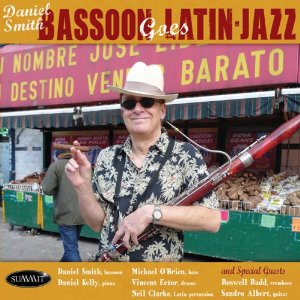Home » Jazz Articles » Album Review » The Jimmy Giuffre 3: 7 Pieces
The Jimmy Giuffre 3: 7 Pieces
As a multi-reed artist, Giuffre was certainly one of the most original and creative visionary forces in jazz. Perhaps Giuffre's best known ensemble was his first: a combo that was unorthodox in its day, featuring Giuffre, Jim Hall on guitar, and one of several bass players. A highlight of this combo, 7 Pieces (Verve, 1959), has been reissued with the addition of some never-before-heard live material. It all adds up to a devilishly good reminder of why Giuffre was such a great musician.
This trio must have seemed a little far out in the late fifties. The tunes—with no drums and therefore no steady beat—are softly lyrical, meandering creations with discernible melodies that have to be followed for awhile before they fully resolve. Even on something as simple as a blues, like the opening "Happy Man," the trio breaks down the form with instrumental solo interludes and some light call-and-response. "The Little Melody" is representative, beginning with a repeated statement for a few bars, then pausing,and finally restarting with improvisation, but at a greatly reduced tempo. It wanders for awhile, drifting and flowing about, seemingly aimlessly, barely pinned to the melody before recapitulating for its close. It's a sparse track, with a light, free flowing set of ideas that are hard to resist.
The reissue contains four additional tracks, recorded live in Rome in 1959. For a live session from that era, these monaural tracks are exceptionally well-recorded, rivaling—if not exceeding—the sound quality of the studio tracks. These tunes swing a little harder, perhaps because of the face-to- face interaction with the audience, and include the up-tempo "Four Brothers," which Giuffre wrote for Woody Herman's orchestra earlier in his career. Buddy Clark slams out a pulsing bass line that fulfills both his own role and the portion that would ordinarily be handled by the drums.The addition of what is essentially a bebop line breaks the mold of the record, but within the trio context it simply adds another dimension to Giuffre's work, showing a glint of where he began his musical adventure.
7 pieces exemplifies the power of an artist who was willing to experiment with an unconventional lineup to create truly original, and enduringly good music.
Track Listing
Happy Man; Princess; Song of the Wind; Lovely Willow; The Little Melody; The Story; Time Machine; Two Degrees East, Three Degrees West; Four Brothers; Princess; Careful.
Personnel
Jimmy Giuffre
clarinetJimmy Giuffre: clarinet, tenor, baritone saxophones; Jim Hall: guitar; Red Mitchell: bass (1-7); Buddy Clark: bass (8-11).
Album information
Title: 7 Pieces | Year Released: 2011 | Record Label: Essential Jazz Classics
Tags
PREVIOUS / NEXT
Support All About Jazz
 All About Jazz has been a pillar of jazz since 1995, championing it as an art form and, more importantly, supporting the musicians who make it. Our enduring commitment has made "AAJ" one of the most culturally important websites of its kind, read by hundreds of thousands of fans, musicians and industry figures every month.
All About Jazz has been a pillar of jazz since 1995, championing it as an art form and, more importantly, supporting the musicians who make it. Our enduring commitment has made "AAJ" one of the most culturally important websites of its kind, read by hundreds of thousands of fans, musicians and industry figures every month.





















